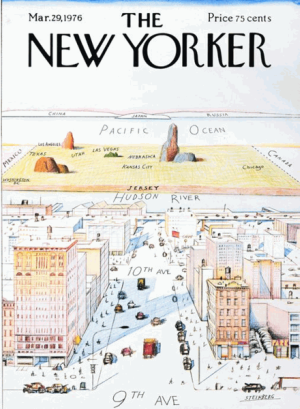'Should Gary Johnson and Jill Stein really be distracting voters this year?'
The New Yorker goes full New Yorker in lament over, you know, democracy.

If you've ever wondered how the two major parties ended up nominating the two most-hated presidential candidates in history, part of the answer can be found in the unintentionally hilarious New Yorker story, "The Stakes of the Third-Party Candidates," by Amy Davidson. Really, it's like a Borowitz Report, only funny. The subtitle gives away the article's argument: "Should Gary Johnson and Jill Stein really be distracting voters this year?"
The insularity of the piece calls to mind two other bits associated with The New Yorker: Saul Steinberg's 1976 cover (see below) depicting the "view of the world from 9th Avenue" and the famous misquote about Pauline Kael being surprised at Richard Nixon's 1972 victory, since the magazine's film critic didn't know anybody who voted for him. To view third parties as a "distraction" in any way, shape, or form is, simply, bullshit. It presumes there is a center to politics that is not only ideologically unchanging but morally right.
Davidson dredges up the photo-finish in Florida during the 2000 election, which is the trauma from which liberals have yet to recover (they never will, either, if they keep insisting that Ralph Nader, rather than their own awful candidate, cost them the presidency that year).
Clinton has a narrow lead in a head-to-head contest with Trump, which diminishes when the contest is polled as a four-way race. In 2000, Al Gore officially lost Florida to George W. Bush by five hundred and thirty-seven votes; Ralph Nader, the Green candidate, got almost a hundred thousand votes there….
Many Americans consider their votes to be meaningless, because they see the major parties as members of the same corporate oligarchy or as big-government enemies of individual freedoms, or the candidates as generic self-serving politicians.
The piece is in the October 17 issue of The New Yorker, so who knows exactly when it was written. Probably before the Pussygate tape surfaced, since the audio tape and its fallout among Republicans have given Clinton supporters some breathing space. Yes, Trump was already behind heading into last weekend and the latest revelations (with a promise of more to come), will make it even harder for the short-fingered vulgarian to beat the Democratic nominee.
But leapin' lizards, what the hell is wrong with The New Yorker? When writers there are not pronouncing as "scientific fact" that "a vote for Jill Stein is a vote for Donald Trump," they are attacking Bill Weld for not selling out his running mate and then castigating the former Massachusetts governor for saying things such as:
"This is a year when voters looking at the two establishment parties are thinking, I'm watching a scary movie and I can't change the channel. Well, you can change the channel!"
Now, that may not rise to the level of a scientific fact, but it does seem a pretty good summation of the general mood of voters. Fully 59 percent disapprove of Trump and 52 percent don't like Clinton, according to RealClearPolitics' averaging of various polls. The same source finds, even after the second presidential debate and Pussygate, that less than 45 percent of voters say they'll cast a ballot Clinton's way and about 40 percent still want Trump. Johnson is polling around 7 percent on average and Stein is sitting at 2 percent. If you're a Democrat, it kind of sucks to be you, doesn't it? Sure, you're ahead for the moment but not by as much as you should be—Clinton herself has wondered why she isn't 50 points up—and there's almost 10 percentage points out there being sucked up by mere third parties, including one ticket headed up by a goof two-term former Republican governor of New Mexico who is anti-war, pro-choice, pro-immigration, pro-trade (just like Clinton is in front of certain audiences), and a bunch of other stuff that plays well with Democrats and millennials.

Nowhere in her article does Davidson bother to rebut her own apt summation of why voters aren't overwhelmingly pro-Clinton. It's enough, it seems, to merely point out how benighted "many Americans" are to "see the major parties as members of the same corporate oligarchy or as big-government enemies of individual freedoms, or the candidates as generic self-serving politicians."
What part of that statement is wrong, exactly? To be sure, there are differences between Trump, whose racial, sexual, and ethnic taunts are despicable and has no relevant experience to be president, and Clinton, whose career is a pretty good case against voting for her if you believe in free speech, peace, and economic freedom. Given the Wikileaks revelations about Clinton's private speeches to wealthy audiences and her articulation of private vs. public positions on just about everything, Davidson might even have had the Democrat in mind when she was talking about corporate oligarchs and self-serving pols. (Do note, by the way, the Clinton didn't disown her comments during the debate, suggesting the Wikileaks' emails are accurate.)
Are candidates such as Johnson, who is on the ballot everywhere, really a distraction in such an election? Of course not. He's the emodiment of a pluralistic democracy, offering voters not simply another choice but a radically different—and plausible—one (his and his running mate's experience in office set them apart from Jill Stein and the Green Party ticket, though that doesn't mean they shouldn't have been in the debates, too).
No wonder the Libertarian ticket is polling at historically high numbers, and no wonder that fearful Democrats and Republicans, who are dying off like non-reproducing members of the Shakers, are so focused on Johnson. How dare he give voice to 10 percent of the voting population, or 7 percent, or even 5 percent! This is America, goddammit, we don't have time for an ever-increasing array of choices that reflect our individual desires, demands, and dreams! Especially when it comes to politics, amirite?
Related: Four Reasons Gary Johnson (and Jill Stein) Should Have Been Included in the Debates.


Show Comments (217)